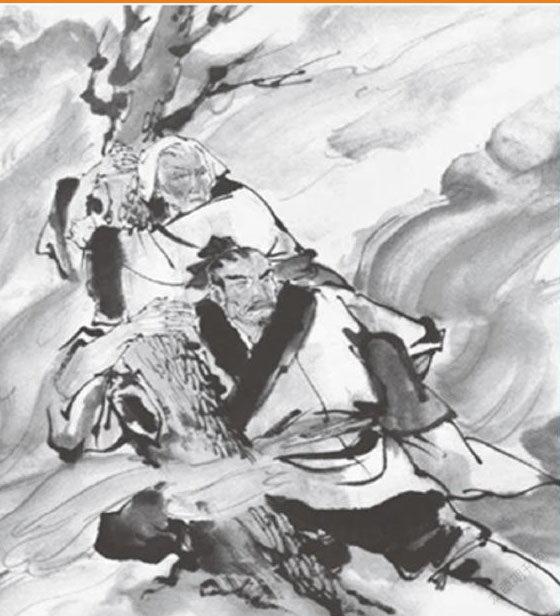The Origin of Qingming Festival 清明节的起源
雷哲为
清明节是传统的春祭节日,扫墓祭祀、缅怀祖先,是中华民族数千年以来的优良传统,不仅有利于弘扬孝道亲情、唤醒家族共同记忆,还可促进家族成员乃至民族的凝聚力和认同感。今天,就让我们一起来了解下清明节的起源吧!

The Chinese Qingming Festival is usually falls on either April 4 or 5.Also known asTomb Sweeping Day, it is a time for families to remember and pay respects to the ancestors.
The origin of the festival dates back to the spring and autumn period, 770 to 476 B.C.It was to honor Jie Zhi-Tui, a loyal follower of the 1)Duke Wen of Jin state.Before he became the king, Jie cut a slice of meat from his own 2)thigh to make soup for the starving duke.A gratified Wen promised to reward Jie, but when he became king, he forgot about Jie.Jie, seeking no gain or reward, quietly left to live in a forest with his elderly mother.When Wen realized his mistake, he tried to 3)persuade Jie to return to the court by setting fire to the forest.But Jie and his mother died in the fire.A saddened Wen declared that no fires could be lit on that day.Thus, people would only eat cold food, and the festival was originally called Cold FoodFestival.
During the Tang Dynasty, the festival evolved into a tomb-sweeping event.By the time of the Song Dynasty, candles were also used.Today, Chinese families visit the tombs of their ancestors to pay respects.They sweep the tomb area and clear the weeds.Then they offer food, flowers, for their ancestors.The one-day festival is also known as Qingming Festival or Ancestor's Day.
中国的清明节通常在4月4日或4月5日。清明节也称扫墓节,这是个家人们纪念并凭吊祖先的时节。
清明节的来源可追溯到公元前770至公元前476年的春秋时期。清明节是为了纪念晋文公的忠诚追随者介之推。在晋文公成为国王以前,介之推曾从他自己的大腿.上切下一片肉来煮汤给饥饿的晋文公吃。感激的晋文公承诺要回报介之推,但登上王位后,他遗忘了介之推。不求回报的介之推与年迈的母亲悄悄离开宫廷并住在山林里。当晋文公发现自己的错误时,他试着以火烧山林的方法来逼介之推出来返回宫廷。结果介之推和他的母亲葬身在火海中。悲恸的晋文公最后下令全国在那天不得生火。因此,人们只能吃寒食,而这节日原本被称作“寒食节”
唐朝期间,这节日演变成一项扫墓的活动。到宋朝,也会使用蜡烛。如今,中国家庭带着敬意到祖先的坟墓前凭吊。他们打扫墓区并清除杂草,然后供奉食物、鲜花给他们的祖先。这为期一天的节日也被称作清明节或祭祖日。
1)duke[du:k]n.公爵
2)thigh[θai]n.大腿
3)persuade[pa'sweld]vt.说服,劝说
词组加油站
date back to可追溯到,始于(某时期)
promise to do答应做某事
名师考点小结:either…or…的用法与语法特点
在我們日常英语学习中,并列连词在句子中出现的频率非常高,对英语学习者来说,我们一定要了解并掌握常见的并列连词以及它们在句子中的用法。
eithe…or…主要用于表示选择,其意为“要么……”“或者……或者……”
1.用于连接两个性质相同的词或短语。如:
(1)Love is a kind of feeling.Either yes or no.No mercy in between.爱情是一种感觉。有就有,没有就没有,当中没有施与受。
(2)Complaining is silly.Either act or forget.
与其愚蠢地抱怨,不如选择行动或忘却。
在具体使用either…or…时还应注意以下几点:
2.either…连接两个成分作主语时,谓语动词通常与其靠近的主语保持一致。如:
Either you or lam to go.你或我必须有一个人去。
但在非正式文体中,有时也会一律用复数谓语。如:
If either David or Janet come, they will want a cup of tea.
大卫或珍妮特来的话,是要喝茶的。
3.either…or…除可连接两个词或短语外,有时也可连接两个句子。如:Either you must improve your work or I shall dismiss you.
要么你改进工作,要么我就辞退你。
4.either…or…的否定式可以是not either…or…也可以是neither…nor…如:
He didn't either write or phone.=He neither wrote nor phoned.
他既没写信又没打电话。
Either you or she is good at drawing.变为否定句应为:Neither you nor she is good at drawing.你和她都不擅长绘画。
5.注意,正如不能说either…not 一样(但可说not…either),英语习惯上也不说either…or…not, 如:Either he or his wife hasn't come.可改为:Neither he nor his wife has come.
6.我们还可以单独使用either,其意为“两者中的任何一个”。例如:There are many shops on either side of the street.街道两边有许多商店。这个句子也可以这样表达:There are many shops on both sides of the street.在街道兩边有许多商店。
7.either用在否定句的句末,表示“也”的意思。例如:
If you don't go there, I won't, either.如果你不去那里,我也不去。

